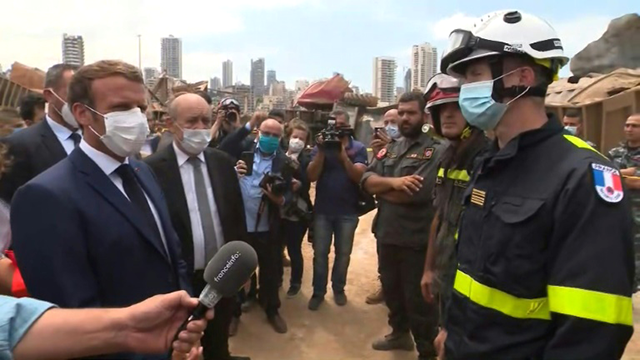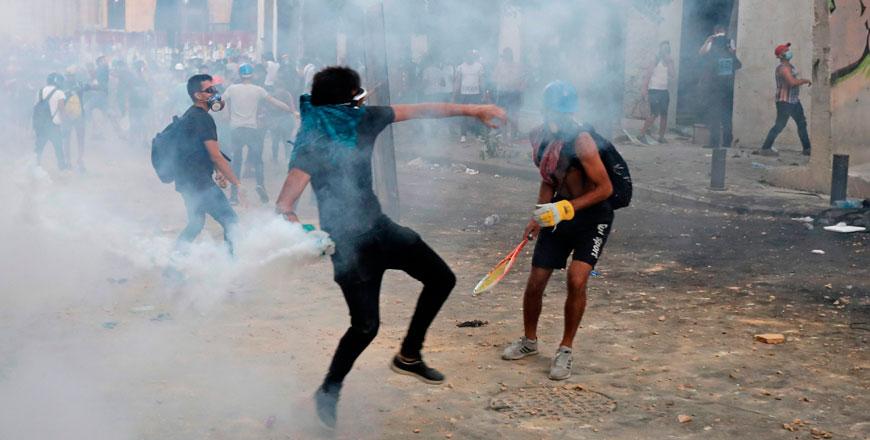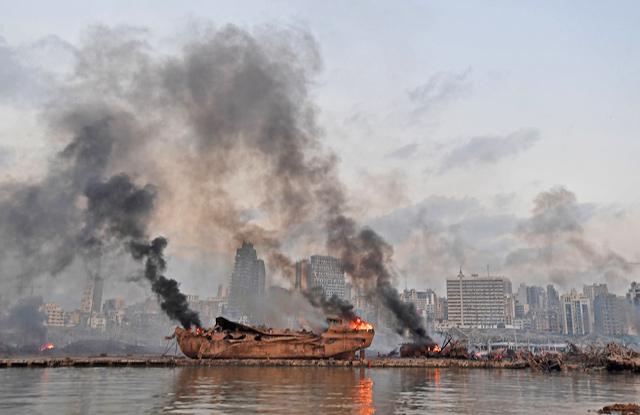You are here
Macron visits traumatised Lebanon to offer help, urge reform
By AFP - Aug 06,2020 - Last updated at Aug 06,2020

French President Emmmanuel Macron at the devastated port of Lebanon's capital Beirut on Thursday (AFP photo)
French President Emmanuel Macron visited shell-shocked Beirut on Thursday, pledging support and urging change after a massive explosion devastated the Lebanese capital in a disaster that has sparked grief and fury.
"Lebanon is not alone," he tweeted on arrival before pledging Paris would coordinate international relief efforts after the colossal blast killed at least 137 people, wounded thousands and caused billions of dollars in damage.
But Macron also warned that Lebanon -- already mired in a deep economic crisis, in desperate need of a bailout and hit by political turmoil -- would "continue to sink" unless it implements urgent reforms.
Public anger is on the boil over the blast caused by a massive pile of ammonium nitrate that had for years lain in a ramshackle portside warehouse -- proof to many Lebanese of the deep rot at the core of their state system.
Macron visited Beirut's harbourside blast zone, now a wasteland of blackened ruins, rubble and charred debris where a 140 metre wide crater has filled with sea water.
As Macron inspected a devastated pharmacy, angry crowds outside vented their fury at their "terrorist" leadership, shouting "revolution" and "the people want an end to the regime!"
"Come rule us!" one man yelled at the president.
Much of Beirut's port district was obliterated by the force of Tuesday's monster explosion of 2,750 tonnes of ammonium nitrate fertiliser / © AFP
Macron told them he would urge Lebanon's leaders to accept "a new political deal" and "to change the system, to stop the division of Lebanon, to fight against corruption".
Macron's visit to the small Mediterranean country, France's Middle East protege and former colonial-era protectorate, was the first by a foreign head of state since Tuesday's unprecedented tragedy.
Two days on, Lebanon was still reeling from a blast so huge it was felt in neighbouring countries, its mushroom-shaped cloud drawing comparisons with the Hiroshima atom bomb.
'Shock to anger'
"Apocalypse", "Armageddon" -- Lebanese were lost for words to describe the impact of the blast, which dwarfed anything the country had experienced in its violence-plagued history.
The deadly explosion left dozens more missing and a staggering 5,000 people wounded, many by flying shards of glass as windows imploded.
The death toll was expected to rise as rescue workers keep digging through the rubble.
Offering a glimmer of hope amid the carnage, a French rescuer said there was a "good chance of finding... people alive", especially a group believed to be trapped in a room under the rubble.
"We are looking for seven or eight missing people, who could be stuck in a control room buried by the explosion," the colonel told Macron as he surveyed the site.
Paris has spearheaded international mobilisation in support of Lebanon, where flights carrying medical aid, field hospitals, rescue experts and tracking dogs have arrived since Wednesday.
Beirut's governor estimated up to 300,000 people have been left temporarily homeless by the destruction, which he said would cost the debt-ridden country in excess of three billion dollars.
According to several officials, the explosion was caused by a fire igniting 2,750 tonnes of ammonium nitrate fertiliser stored for years in the warehouse.
Even as they counted their dead and cleaned up the streets, many Lebanese were consumed with anger over a blast they see as the most shocking expression yet of their leadership's incompetence.
"We can't bear more than this. This is it. The whole system has got to go," said 30-year-old Mohammad Suyur as he picked up broken glass in Mar Mikhail, one of the worst-hit city districts.
Prime Minister Hassan Diab and President Michel Aoun have promised to put the culprits behind bars, but trust in institutions is low and few on Beirut's streets held out hope for an impartial inquiry.
Spontaneous solidarity
The disaster could reignite a cross-sectarian protest movement that erupted last October and had looked briefly like it could topple what activists consider a hereditary kleptocracy.
The euphoria had faded amid grinding economic hardship and the coronavirus pandemic. But since the disaster, social media is once more rife with calls to kick out Lebanon's widely reviled leaders.
"Lebanon's political class should be on guard in the weeks ahead," Faysal Itani of think-tank the Cenre for Global Policy wrote in The New York Times.
"Shock will inevitably turn to anger."
Apartments in high-rise blocks in the city centre were devastated by the blast which hit with the force of an earthquake / © AFP
Human Rights Watch supported mounting calls for an international probe into the disaster, saying it was "the best guarantee that victims of the explosion will get the justice they deserve".
In France, prosecutors have opened a probe into the blast over injuries suffered by 21 French citizens.
Amid the gloom and fury, the aftermath of the terrible explosion has also yielded countless uplifting examples of spontaneous solidarity.
Business owners swiftly took to social media, posting offers to repair doors, paint damaged walls or replace shattered windows for free.
Lebanon's diaspora, believed to be nearly three times the tiny country's population of 5 million, has rushed to launch fundraisers and wire money to loved ones.
In Beirut, much of the cleanup has been handled by volunteers in improvised working groups who bring their own equipment and organise online appeals for help.
"We're sending people into the damaged homes of the elderly and handicapped to help them find a home for tonight," said Husam Abu Nasr, a 30-year-old volunteer.
"We don't have a state to take these steps, so we took matters into our own hands."
Related Articles
BEIRUT/PARIS — Lebanese protesters enraged by official negligence blamed for Beirut's enormous and deadly explosion vowed Sunday to rally ag
BEIRUT — Rescuers searched for survivors on Wednesday after a cataclysmic explosion at Beirut Port sowed devastation across entire city neig
BEIRUT — Lebanese authorities have seized 20 tonnes of ammonium nitrate, the same chemical behind a deadly explosion last year at Beirut's p

















